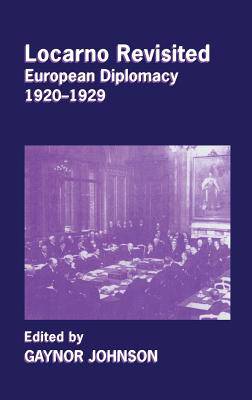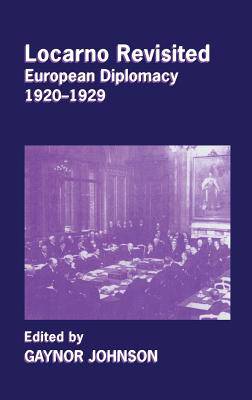
Bedankt voor het vertrouwen het afgelopen jaar! Om jou te bedanken bieden we GRATIS verzending (in België) aan op alles gedurende de hele maand januari.
- Afhalen na 1 uur in een winkel met voorraad
- In januari gratis thuislevering in België
- Ruim aanbod met 7 miljoen producten
Bedankt voor het vertrouwen het afgelopen jaar! Om jou te bedanken bieden we GRATIS verzending (in België) aan op alles gedurende de hele maand januari.
- Afhalen na 1 uur in een winkel met voorraad
- In januari gratis thuislevering in België
- Ruim aanbod met 7 miljoen producten
Zoeken
Locarno Revisited
European Diplomacy 1920-1929
€ 305,45
+ 610 punten
Omschrijving
This collection of essays examines European politics and diplomacy in the 1920s, with special emphasis on the Treaty of Locarno of 1925, often seen as the 'real' peace treaty at the end of the First World War. Contributors discuss the diplomacy of the principle countries that signed the Treaty of Locarno in 1925 and consider the issues of greatest importance to the study of European history in the 1920s. They also assess whether the treaty could be seen as the 'real' peace treaty with Germany at the end of the First World War. Key chapters include: Locarno, Britain and the Security of Europe; Locarno: Early Test of Fascist Intentions; Locarno and the Irrelevance of Disarmament. 'Locarno diplomacy' meant different things to each of the countries involved. The inability of contemporaries to arrive at a working consensus about what the treaty was intended to achieve weakened it and paved the way for its destruction. Unlike the Paris Peace Conference, however, the Treaty of Locarno and the era of diplomacy to which it gave its name, were not always seen as flawed. Until 1945, they were held up as one of the high points of European diplomacy in the 1920s. This book asks whether it is still appropriate to under-rate the importance of the Treaty of Locarno
Specificaties
Betrokkenen
- Uitgeverij:
Inhoud
- Aantal bladzijden:
- 252
- Taal:
- Engels
- Reeks:
Eigenschappen
- Productcode (EAN):
- 9780714656557
- Verschijningsdatum:
- 19/08/2004
- Uitvoering:
- Hardcover
- Formaat:
- Genaaid
- Afmetingen:
- 155 mm x 240 mm
- Gewicht:
- 517 g

Alleen bij Standaard Boekhandel
+ 610 punten op je klantenkaart van Standaard Boekhandel
Beoordelingen
We publiceren alleen reviews die voldoen aan de voorwaarden voor reviews. Bekijk onze voorwaarden voor reviews.








